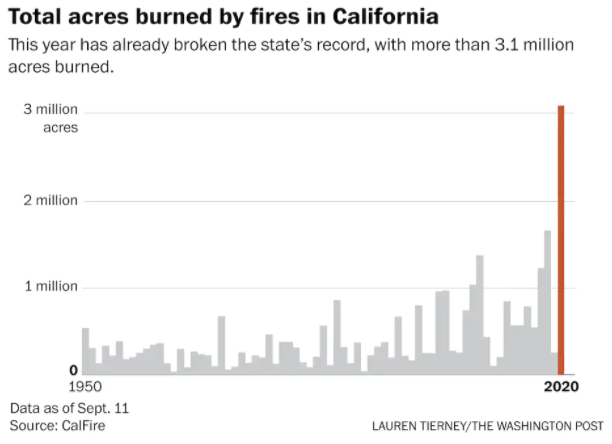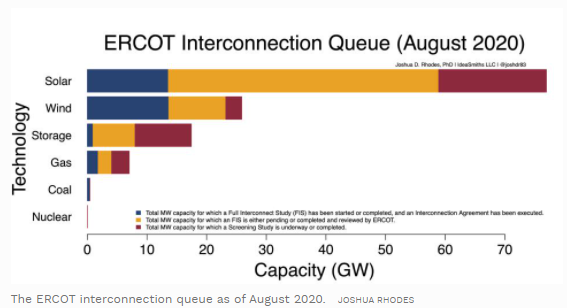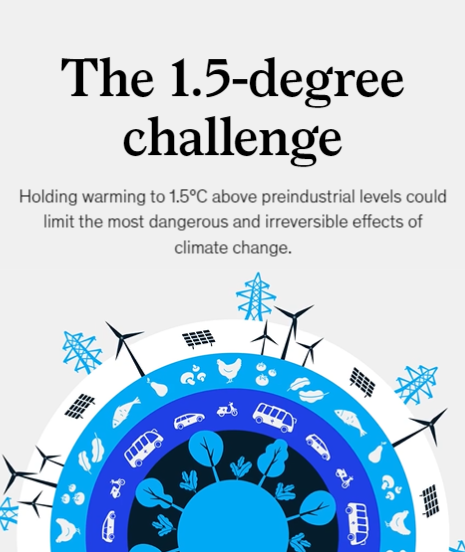7 big climate stories from 2020
Climate change represents enormous risks and opportunities for business. Risks lie in the physical consequences of droughts, floods, fires, storms, and heat waves, and in intangible factors like uncertain regulation and changing public opinion. Opportunities lie in the soaring demand for innovative solutions to decarbonize our economy.
Navigating these risks and opportunities is a complex challenge. To help, we pulled together some of the country’s leading minds on corporate sustainability for a live, virtual discussion on October 6 at 10:30 AM. McKinsey & Company will present their recent research on climate risks and what it means for business, and sustainability leaders at Amazon, Skanska, JLL, and Pepco will share how their companies are making plans and investments for a low-carbon future. Find more information on that event and register here for free.
In advance of that conversation, here are seven big climate headlines from 2020. Taken together, they paint a picture of where we are in responding to this enormous challenge.
Treading Water: Climate change is all too real for D.C. developers and leaders — and they’re working mightily to adapt.

February 7, 2020
In this Washington Business Journal feature, senior staff writer Daniel J. Sernovitz provides a sweeping look at how flooding is projected to worsen in our region and how city governments and developers are adapting. He catches several key angles, from the Alexandria City Council attempting fiscal gymnastics to upgrade sewer infrastructure to D.C. waterfront developers using cutting-edge architecture and engineering to prepare their buildings for the next 100-year storm.
CFTC report: Climate change poses serious risk to financial system
September 8, 2020

The Commodity Futures Trading Commission issued a report which represented “the starkest warning to date by a U.S. financial regulator over the stresses that markets will face from climate change,” according to Politico. The cross-sector task force behind the report included experts from financial institutions, fund managers, commodities and energy companies, and environmental organizations.
Western wildfires: An ‘unprecedented,’ climate change-fueled event, experts say
September 11, 2020

The wildfires in the west captured the nation’s attention this year because they were truly unprecedented in their destruction—burning over 3 million acres of land (and counting) in California, about double the record set in 2018. The smoke created dangerously bad air quality for millions of west coast residents and after drifting east could be seen high in the skies over our own region, thousands of miles away. Fire seasons in the West are trending more destructive, and experts say poor forest management and the hotter, drier weather created by climate change are both to blame.

Business Roundtable endorses market-based climate policy
September 15, 2020

The Business Roundtable, a trade association representing companies with $7 trillion in combined annual revenues, announced its position in support of U.S. public policy that aligns with the international effort to limit global warming to 2 degrees C. This includes support for market-based mechanisms such as pricing carbon emissions through a tax or cap-and-trade system. You can read the full position here.
China’s Pledge to Be Carbon Neutral by 2060: What It Means
September 23, 2020

China’s leader, Xi Jingping, recently surprised climate experts around the world when he announced to the United Nations that China commits to reaching climate neutrality by 2060. China produces about 28 percent of the world’s greenhouse gas emissions—more than any other country—and is notoriously dependent on coal, but it is also the world’s largest manufacturer of electric vehicles and produces 30 percent of the world’s renewable energy. Whether China keeps its promise depends on economic and political factors that are hard to predict, but if it does, it will be a big step toward meeting international climate goals.
California Governor Signs Order Banning Sales Of New Gasoline Cars By 2035
September 23, 2020

California Governor Gavin Newsom signed an executive order banning the sale of new gasoline-powered cars beginning in 2035, giving the auto industry 15 years to make this transition. Transportation is California’s largest source of greenhouse gas emissions, and though electric car purchases have increased, they represent only 8 percent of all auto sales.
Even Renewables Are Bigger in Texas
(Forbes, September 25, 2020)
This year, Texas is planning on gaining a huge amount of wind and solar power. The vast majority of energy projects in the pipeline to connect to Texas’s electricity grid are wind, solar, or energy storage, dwarfing the number of gas, coal, and nuclear projects. On the local level, analysts found that many landowners and municipalities now favor solar and wind because the revenues they generate are more stable than oil, which is prone to boom and bust cycles.

Bonus: build your foundation of climate knowledge with McKinsey & Company research
We are glad to have McKinsey & Company as our knowledge partner on the October 6 webinar and other climate-related activities. Browse their robust and consolidated library of climate change analysis to deepen your understanding of climate science, market trends, and business strategies.
A good place to start: The 1.5-degree challenge, an interactive and dynamic explainer on what it means to avoid the worst impacts of climate change.

Become a member today
We need your voice at the table to make Greater Washington a place where everyone can succeed



















